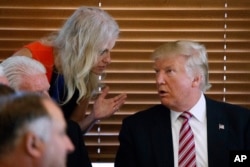President-elect Donald Trump renewed Sunday his unsubstantiated allegations of vote fraud in the election he won earlier this month.
He wrote in Twitter that he would have defeated Democrat Hillary Clinton in the nationwide popular vote "if you deduct the millions of people who voted illegally." Four hours later, he called into question the results in three states he lost to Clinton on November 8.
"Serious voter fraud in Virginia, New Hampshire and California -- so why isn't the media reporting on this? Serious bias -- big problem!"
Trump will take office in January because he won a majority under the Electoral College system used to choose presidents in the United States, despite trailing in the total vote by about 2 million. Before election day he regularly made statements suggesting the voting process was rigged or fraudulent, but never provided any evidence to back up those claims.
In October, he said the election was being rigged not only by the media "but also at many polling places" in favor of Clinton. He also called out his party for not backing his claims.
"Of course there is large scale voter fraud happening on and before election day," he tweeted on October 17. "Why do Republican leaders deny what is going on? So naive!"
California Secretary of State Alex Padilla called Trump's latest statements Sunday "baseless and counterproductive," and said Trump was acting irresponsibly.
"It appears that Mr. Trump is troubled by the fact that a growing majority of Americans did not vote for him," Padilla said. "His unsubstantiated allegations of voter fraud in California and elsewhere are absurd. His reckless tweets are inappropriate and unbecoming of a president-elect."
Trump in recent days also criticized an effort by Green Party candidate Jill Stein, later joined by Clinton's campaign, to call for a recount of the vote in the state of Wisconsin, which Trump narrowly won.
His campaign manager Kellyanne Conway, speaking Sunday on ABC News, called the recount effort "ridiculously fantastical" and questioned why Clinton would not accept the results. She recalled how Trump himself was asked repeatedly before election day if he would do so, though those questions were prompted by his own refusal last month to say definitively that he would.
Any recount in Wisconsin, or in Pennsylvania and Michigan where Stein also wants authorities to look at the votes, is unlikely to affect the outcome of the election.
Clinton election lawyer Marc Elias wrote Friday in a statement that the campaign is aware the number of votes she lost by in those states is larger than any deficit ever overcome in an election recount, and that after doing its own investigation it had not planned on taking any action of its own.
"Because we had not uncovered any actionable evidence of hacking or outside attempts to alter the voting technology, we had not planned to exercise this option ourselves, but now that a recount has been initiated in Wisconsin, we intend to participate in order to ensure the process proceeds in a manner that is fair to all sides," he said.
He further commented Sunday after the criticism from Trump.
"We are getting attacked for participating in a recount that we didn't ask for by the man who won election but thinks there was massive fraud," Elias said on Twitter.
Out of millions of votes cast, Trump won by about 27,000 votes in Wisconsin, 12,000 in Michigan and 68,000 in Pennsylvania. Stein got about 1 percent of the vote in each of those states.
There were ongoing concerns that Russian hackers might try to influence the election, particularly after U.S. officials alleged that they successfully hacked the computer network of the Democratic National Committee and tried to hack voter registration databases. Researchers who investigated the cyber-attacks concluded that Russians created and disseminated fake news about the election, apparently to try to help Trump win.
A post on Stein's campaign website called the voting machines used in Wisconsin "highly vulnerable to hacking and malicious programming" and said the machines lacked any security features.
The state must meet a federal deadline of December 13 to complete the recount.






